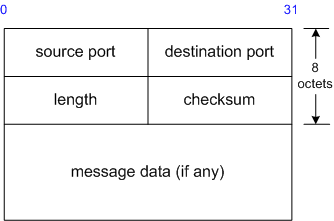
The User Datagram Protocol (UDP) is a connectionless transport-layer protocol (Layer 4) that belongs to the Internet protocol family. UDP is basically an interface between IP and upper-layer processes. UDP protocol ports distinguish multiple applications running on a single device from one another.
Unlike the TCP, UDP adds no reliability, flow-control, or error-recovery functions to IP. Because of UDP's simplicity, UDP headers contain fewer bytes and consume less network overhead than TCP.
UDP is useful in situations where the reliability mechanisms of TCP are not necessary, such as in cases where a higher-layer protocol might provide error and flow control.
UDP is the transport protocol for several well-known application-layer protocols, including Network File System (NFS), Simple Network Management Protocol (SNMP), Domain Name System (DNS), and Trivial File Transfer Protocol (TFTP).
